Two days before Trinh Cong Son passed away, Tran Manh Tuan came to his house to pay the copyright fee of 10 million VND, but the musician only took 10,000 VND symbolically.
On the morning of April 1, Tran Manh Tuan, using a cane, and his wife visited Trinh Cong Son's family home in Pham Ngoc Thach alley (District 3, Ho Chi Minh City), on the occasion of the musician's 23rd death anniversary. Led into the living room by his students, he looked at Trinh Cong Son's portrait for a long time, then lit incense with his wife. On the altar, relatives placed a plate of green rice cake - the musician's favorite snack when he was alive, and a few branches of sala flowers.
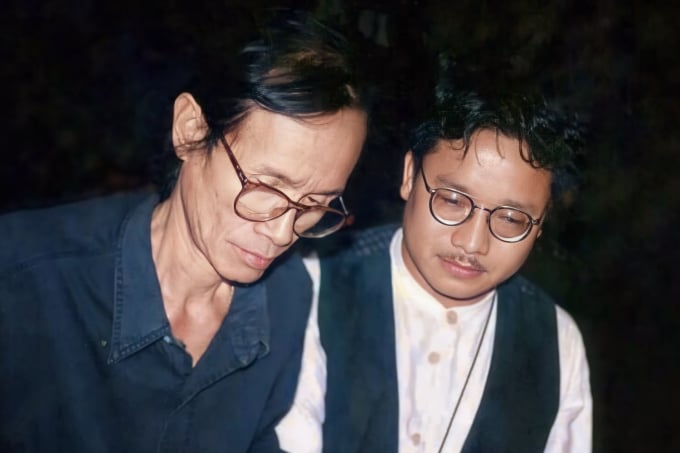
Tran Manh Tuan in his youth with musician Trinh Cong Son. Photo: Provided by the character
The saxophonist's memories are etched in his last meeting with Trinh Cong Son at his home. Two days before his death, he called him to say goodbye. Tran Manh Tuan, who was renting a room just a few houses away from his house, was one of the few people who stayed with the musician during his final days. During his lifetime, Trinh Cong Son valued neatness and courtesy, and did not want outsiders, especially women, to see him in a haggard state.
At that time, Tran Manh Tuan held a paper asking for permission to make the album Ha Trang , along with 10 million VND in copyright fees for 10 songs. The musician shook his head, scribbled 10,000 VND on the paper - a symbolic amount - and signed his name. That was his last signature, which was later printed by Tran Manh Tuan on the cover of Ha Trang - the most successful album of his career with hundreds of thousands of copies released.
Tran Manh Tuan said Trinh Cong Son's death was a big shock to his friends. No one expected his illness to progress so quickly because a month before, he had held a 62nd birthday party. Only he and a few relatives knew that the musician suffered from five incurable diseases related to the lungs, kidneys, and bones.
On the musician's last day, he stayed by his bedside, watching his heart rate on the monitor gradually decrease. "After 23 years, besides his music - the greatest legacy he left behind, I still keep the five oil portraits he painted for me, hanging solemnly in my house," the artist said.
Tran Manh Tuan plays Trinh's medley on the morning of April 1. Video: Mai Nhat
On the anniversary of his death, accompanied by the guitar of artist Tan Son, Tran Manh Tuan played the medley Cat bui - Tinh xa - Bien nho - Nhu canh vac bay. When the artist blew the high note "calling the sun" in Ha trang , singer Trinh Vinh Trinh exclaimed, praising his junior's trumpet sound, which was still as clear and resonant as before he fell seriously ill. At the end of the performance, he boasted that he "could play as many more songs as he wanted", but was advised by the musician's relatives to save his energy.
With a hoarse voice due to post-stroke treatment, Tran Manh Tuan said that every year, no matter how busy he was, the artist and his wife would arrange to visit their elder brother in the profession. In 2021, the stroke made it seem like he had no chance of returning to his profession. The artist had to gradually practice moving his fingers to make his joints more flexible, and practice breathing every day like a newcomer to the profession. "There is only one thing I don't need to learn again, and that is his music. After many years of playing hundreds of Trinh Cong Son's songs, Trinh's music has become ingrained in my blood and flesh," said Tran Manh Tuan.
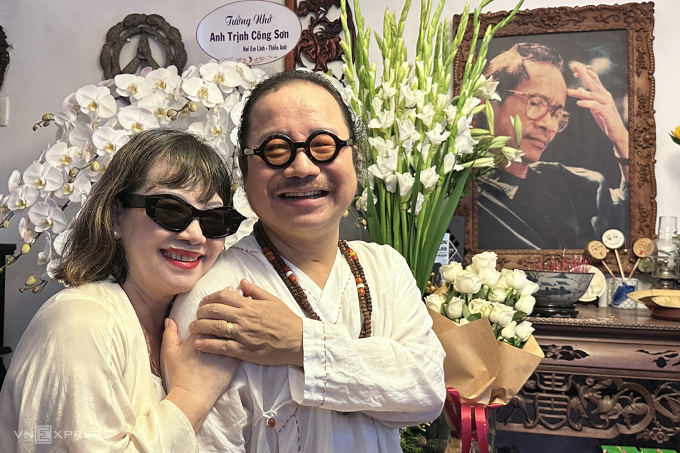
Tran Manh Tuan with Trinh Vinh Trinh - Trinh Cong Son's younger sister - on Trinh's death anniversary April 1. Photo: Mai Nhat
At the end of the event, Tran Manh Tuan and other artists sang together the song "Let's love each other" . The memorial service also featured artist Tan Son with the medley "Xa dau mat troi" - "Em hay ngu di ". Dang Anh Kiet - representative of the Trinh music research and performance group of Fulbright University Vietnam - performed "Ru em tung ngon xuan nong" .
On the occasion of the 23rd anniversary of Trinh's death, on the evening of April 1, music fans participated in the event "Wake-up Night with Trinh", which took place at the musician's grave at Go Dua Cemetery, Thu Duc (HCMC). From 7pm to 5am the next morning, the audience lit candles and placed lotus flowers in remembrance. In Hanoi, the music night "Like a Three -Robed Heron" took place the same evening, with the participation of My Linh, Ha Le, Ngoc Anh, Nguyen Ha, and Luu Huong Giang. On this occasion, the musician's family announced a program to build schools for ethnic minority children in three places - Nam Dong district (Thua Thien Hue), B'lao (Lam Dong) and Buon Ma Thuot - where Trinh Cong Son was born.
Musician Trinh Cong Son was born in 1939 and died on April 1, 2001. He left behind more than 600 songs, of which about 236 songs were popular. Trinh's music is imbued with philosophy, humanity, sincerity, and passion, with great love for the people and homeland of Vietnam and praise for peace. Many names are associated with his music such as: Khanh Ly, Tuan Ngoc, Hong Nhung, Cam Van, Hong Hanh, Quang Dung, of which Khanh Ly is an iconic voice.
Tran Manh Tuan, 54 years old, was born into a family with a musical tradition, his parents and sister are cai luong artists. He is the only saxophone player to be nominated 5 times at the Cong Hien award. Tran Manh Tuan also collaborated with musicians Trinh Cong Son, Hong Nhung, Bang Kieu, Tran Thu Ha. He founded the Sax n' Art jazz club in Ho Chi Minh City, and was a judge on the Vietnam Idol 2008 contest. Tran Manh Tuan's daughter - An Tran - followed in her father's footsteps, becoming a new saxophone talent.
Japanese Plum
Source link


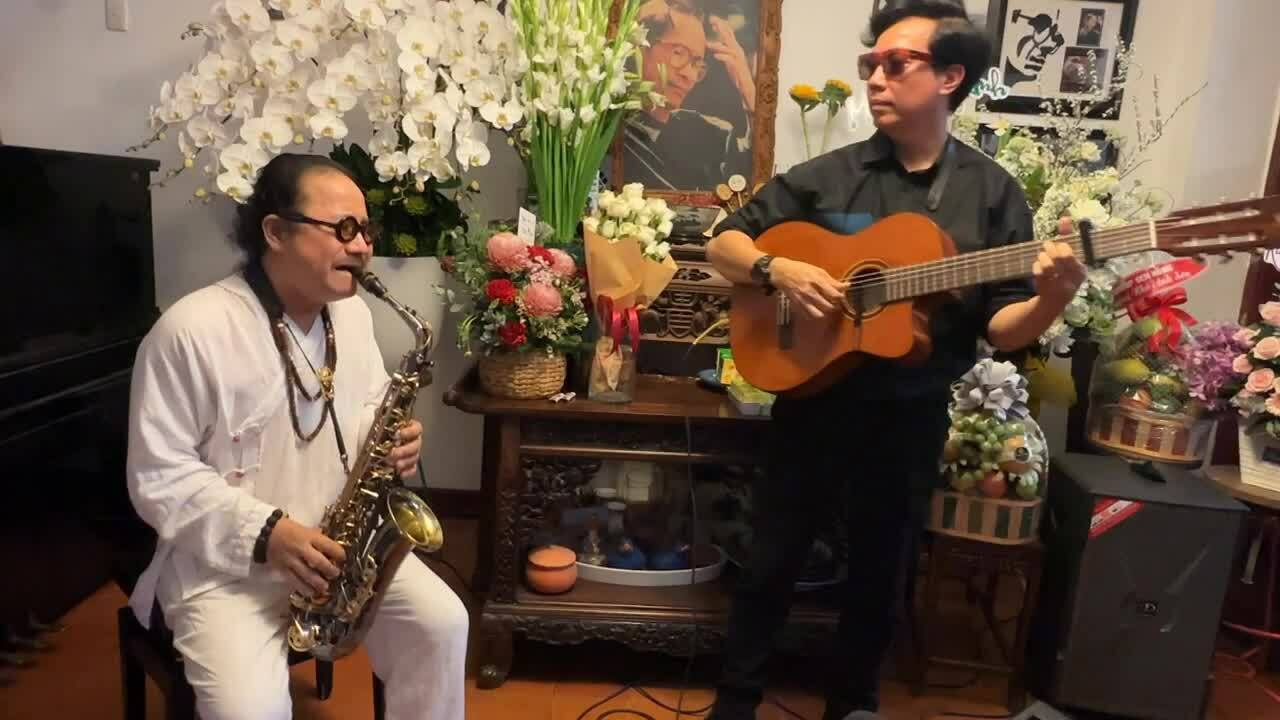
![[Photo] "Lovely" moments on the 30/4 holiday](https://vphoto.vietnam.vn/thumb/1200x675/vietnam/resource/IMAGE/2025/5/1/26d5d698f36b498287397db9e2f9d16c)


![[Photo] Binh Thuan organizes many special festivals on the occasion of April 30 and May 1](https://vphoto.vietnam.vn/thumb/1200x675/vietnam/resource/IMAGE/2025/5/1/5180af1d979642468ef6a3a9755d8d51)
![[Photo] Bustling construction at key national traffic construction sites](https://vphoto.vietnam.vn/thumb/1200x675/vietnam/resource/IMAGE/2025/5/2/a99d56a8d6774aeab19bfccd372dc3e9)





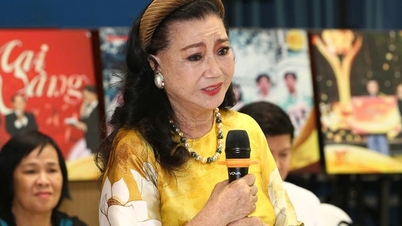



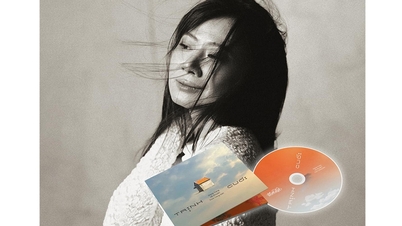







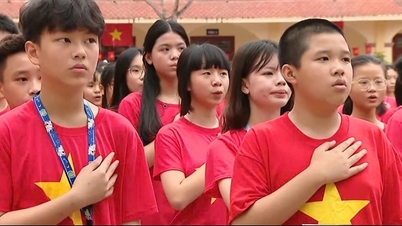











![[Photo] Ha Giang: Many key projects under construction during the holiday season](https://vphoto.vietnam.vn/thumb/1200x675/vietnam/resource/IMAGE/2025/5/1/8b8d87a9bd9b4d279bf5c1f71c030dec)




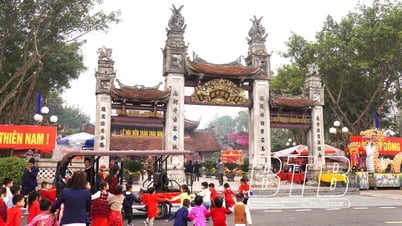












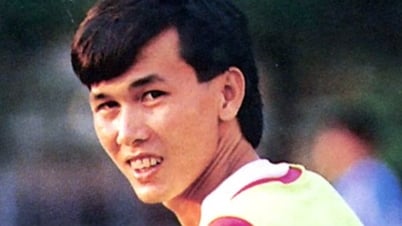


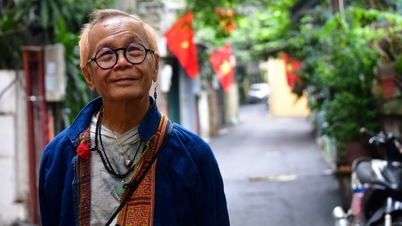



























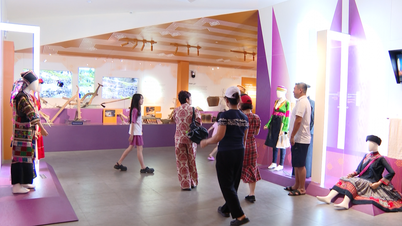

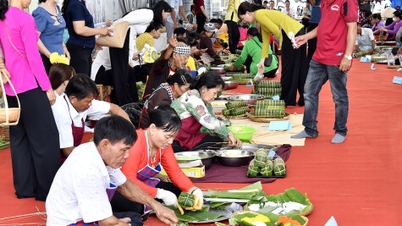

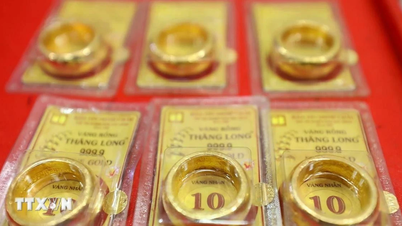












Comment (0)